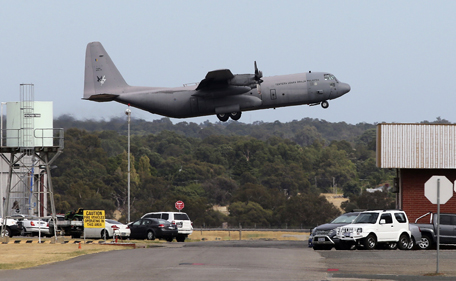 Sydney/Perth, Apr 9: Australian officials said on Wednesday that two new "ping" signals had been detected in the search for Malaysia Airlines Flight MH370, boosting confidence after more than a month of fruitless searching for the missing jetliner.
Sydney/Perth, Apr 9: Australian officials said on Wednesday that two new "ping" signals had been detected in the search for Malaysia Airlines Flight MH370, boosting confidence after more than a month of fruitless searching for the missing jetliner.
The signals, which could be from the plane's black box recorders, bring to four the number of overall "pings" detected in recent days within the search area by a US Navy "Towed Pinger Locator"(TPL).
Angus Houston, head of the Australian agency coordinating the search, struck an optimistic tone when announcing the information, but urged caution as the task of searching the remote Indian Ocean region remained enormous.
"I believe we are searching in the right area but we need to visually identify aircraft wreckage before we can confirm with certainty that this is the final resting place of MH370," Houston told reporters in Perth.
"I'm now optimistic that we will find the aircraft, or what is left of the aircraft, in the not too distant future."
The black boxes record cockpit data and may provide answers about what happened to the plane, which was carrying 227 passengers and 12 crew when it vanished on March 8 and flew thousands of kilometres off its Kuala Lumpur-to-Beijing route.
But the batteries in the beacons have already reached the end of their 30-day expected life, making efforts to swiftly locate them all the more critical.
Authorities say evidence suggests the plane was deliberately diverted by someone familiar with the aircraft, but have not ruled out mechanical problems.
Analysis of satellite data led investigators to conclude the Boeing 777 came down in a remote area of the Indian Ocean, some 2,261 kms (1,405 miles) northwest of the Australian city of Perth.
Fresh pings but in a large area
Up to 11 military aircraft, four civilian aircraft and 14 ships were planned to carry on Wednesday with a massive search that has, so far, yielded frustratingly little concrete information.
On the weekend, the sophisticated US Navy TPL picked up what officials said were two signals consistent with black box locator beacons — the first for more than two hours and the second for about 13 minutes.
On Wednesday, Houston said that another ping was detected on Tuesday afternoon and lasted five minutes, 25 seconds, while a second was picked up on Tuesday night and lasted seven minutes. That brings to four the number of pings found in the area.
But two US Navy officers told Reuters on Wednesday that while the pings had been found within a 1,300 square kilometre area, they were not confident that they represented reoccurances of the same signal.
"I'd say they are separate acoustic events," said US Navy Captain Mark Matthews, citing the fact that the pings are not close together.
"There has been variability in the geographic position which leads me to be less optimistic than I would be if I could consistently reacquire the signal so that I have a nice, small geographic area to focus the autonomous under water vehicle search on," he added.
An autonomous underwater vehicle named Bluefin-21 is onboard the Ocean Shield and could be sent to look for wreckage on the sea floor once intelligence narrows the search area.
The potential search area is currently about 4.5 km (2.8 miles) deep, the outer reach of the Bluefin's range.
A race against time
Although the batteries in the black box recorders are thought to have a lifespan of roughly 30 days, officials have said they can last for as long as two weeks beyond that time.
That meant the search was becoming even more of a race against time than it has been up to now, said Houston.
"I mean, we are looking at this stage for transmissions that are probably weaker than they would have been early on because the batteries of both devices are passed their use-by date and they will very shortly fail," he said.
Despite the new signals being detected, Houston insisted that search teams should exhaust the capability of planes and vessels before deploying underwater vehicles.
"Bear in mind, that the time spent on the surface we're covering six times more area and any given time than we'll be able to do when we go underwater," Houston said.
"So with the batteries likely to fade or fail very shortly, we need to get as much positional data as we can so that we can define a very small search area."




Comments
Add new comment